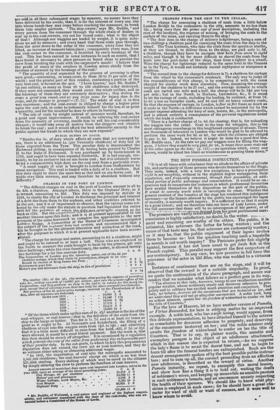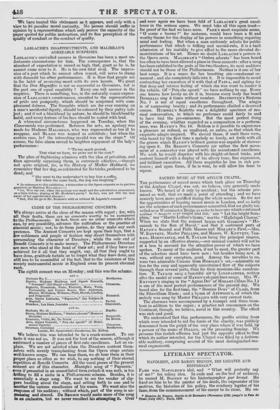THE BEST POSSIBLE INSTRUCTION.
"It is at all times with reluctance that we allude to the affairs of private life, and particularly of those persons who devote themselves to the Stage. They seem, indeed, with a very few exceptions to have a prescriptive right to act naughtily, without in the slightest degree endangering their gt iroancai reputation, and frequently command, through their peccadillos an addi- tional lopuscirttairk otfopeinibulmic erpaatteronthaegiwouldna lfavouritesb e an n ensatanndcceosnlinmwericthicmpiofIetsso have availed themselves of this disposition on the part of the public. It would be scarcely worth while to investigate its cause. Whether the general conduct of the beauties of the stage has rendered this indulgence necessary—or the licence allowed by the public has encouraged the lapse of morality, is scarcely worth inquiry. It is sufficient for us that it exists to a great extent; and we therefore take our leave of Lady y L enox, under the full assurance that there will be no interregnum f her er power, or of The premises are vastly raizzcilairetamlnr_Er_eat professional ma.. conclusion is highly satisfactory, no doubt, to the writer. ment and reasoning are worthy of the ethics. The public, it is intimated, like actresses the better for being wanton ; and the Cause of that taste may be, that actresses are customarily wanton ; or it may be, that the public enjoyment of their lapses invites them to become so : but the question touching such a bagatelle in morals is not worth inquiry ! The Parisians prefer fish slightly tainted, because it has not been usual to get fresh fish in the French capital. This parallel may support the first conjecture of our contemporary. In any view, we now perceive in full force the grievance of the actor in Gil Bias, who was wedded to a virtuous 0 wife. Instances of continence there are on the stage, and it will be observed that the reward is of a suitable singularity. In proof, we quote the continuation of the above paragraph, and assure our readers that we consider what follows as a perfect gem in its way.
"The allusion to this lady, however, brings to our recollection another popular vocalist, whose uniformly steady and decorous adhesion to pro- priety and to celibacy has excited much attention and conjecture. That lady, we believe, deserves all the encomiums that are bestowed on her, and we understand they will not go altogether unrewarded. A noble lord, long an ardent admirer, awaits but the freedom of widowhood to confer on her the title of Countess."
For the love of Heaven, let us have another version of Pamela, or Virtue Rewarded, for here is edifying matter for an improved example. A noble lord, who has awife living, would appear, from this delicate representation, to have attached himself to the actress so remarkable for decorous adhesion to propriety, and deserving of the encomiums bestowed on her; and the noble admirer only awaits the freedom of widowhood to confer on her the title of Countess. That is to say, in plainer words, this amiable and exemplary paragon is the object of an adulterous attachment, which in due season she is expected to return,—for we suppose the lady's flame is to await the decent time, and not to begm to burn till after the funeral torches are extinguished. Such are the decent arrangements spoken of by the best possible public instruc- tors; and to sum up all, the coronet proceeding from an affection now adulterous, is described as the reward of virtue. Another Pamela instantly, we repeat, to exemplify this moral lesson, and show how fine a thing it is to hold out, waiting the death of noblemen's wives, and keeping up meanwhile an amiable passion in such noblemen's breasts, and an uncommon anxiety respecting the health of their spouses. We should like to know what phy- sician is employed in such cases; for he should have a great cha- racter for want of skill or want of success, and it were well to know whom to avoid.
We have treated this statement as it appears, and. only with a view to it peculiar moral curiosity. No person should suffer in opinion by a representation which only proves the capacity of the paper quoted for public instruction, and its fine perception of the quality of conduct or the conduct of quality.



























 Previous page
Previous page